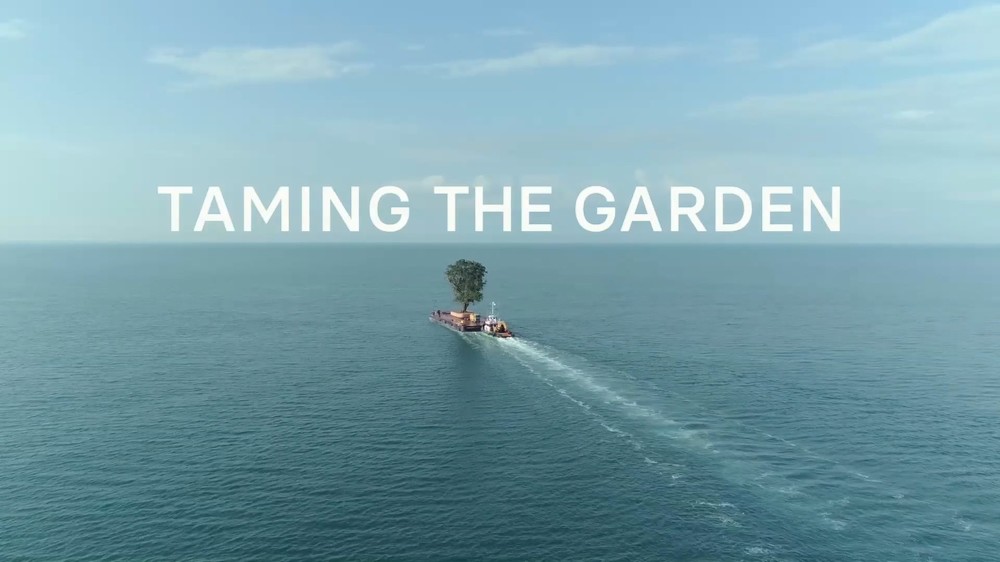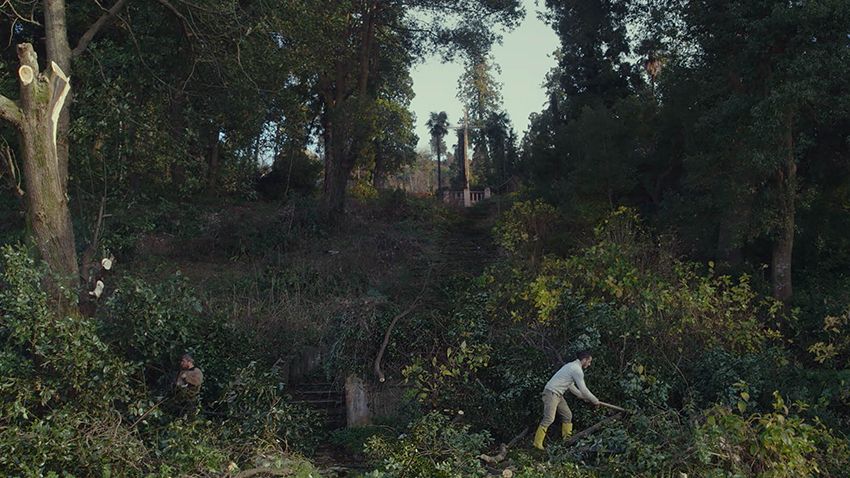By Glenn Dunks
Streaming now on MUBI.

The notes for Taming the Garden reference Werner Herzog and it’s not hard to see why. The absurd relationship between man and nature is as pivotal to Georgian filmmaker Salomé Jashi’s quiet and observant documentary as it is to so many of Herzog’s.
But Jashi’s film is nonetheless one all its own, blending modesty and spectacle in ways that may have its audience questioning the crux of its narrative just as much as its subjects do. It is the bizarre story of one (unseen) billionaire's efforts to uproot seemingly half of Georgia for his own pet arboreal project. Full of mesmerising static shots as trees are lumbered through the landscape looking like the Ents from Peter Jackson’s The Lord of the Rings movies and where the sight of a 30-metre high tree being shipped over the Black Sea attains a surreal grandeur that belies its otherwise restrained tone.
The billionaire in question is Georgia’s former Prime Minister, Bidzina Ivanishvili. His mission was to pay local Georgians in order to dig up and transport large, mature trees that are older than entire bloodlines. For some, there’s little concern. There are trees everywhere, they say. Plus, Ivanishvili’s particular case of entrepreneurism has bought some positives to the remote and rural towns his project has ventured to. Roads, mostly, where dirt paths along dangerous terrain were once the only option.

Others are less inclined to go along with their former leader’s plans. For some, the trees Ivanishvili wants to poach from yards and hillsides are symbols and should not be touched. Some demand more money; others refuse it entirely. His Shekvetili Dendrological Park is wonderous when we finally lay eyes upon it in the final sequences of Jashi’s patient film. But, of course, built upon the backs of the poor for whom even the most meagre of a percentage of Ivanishvili’s immense Russian-fostered wealth would allow them to rise out of poverty.
Taming the Garden reserves any of its filmmaker’s potential opinions about the former Prime Minister for more sharp-eyed viewers, content as it is to keep a safe distance from any overtly political readings. Although many suspect Ivanishvili of still wielding great power, there’s little emphasis on this—any real interrogation by a viewer would likely reach a conclusion that money alone can’t pull off a plan as audaciously mammoth as this. We never see his face, but like most people who reach the highest echelon of power, many of the Georgian people have something to say about him. Jashi allows them this grace to be angry or happy or entirely nonplussed by the whole situation; a political portrait of a man whose face you never see and could likely never recognise in the guise of a movie outside of the politics. It’s an interesting film in that way.
But it is in near silence where Taming the Garden achieves its finest, most mesmerising moments. Throughout, the cinematography of Goga Devdariani and Jashi herself captures moving trees. A giant shadow in the dead of night, illuminated only by sporadic torchlight. A looming evergreen emerging through a spread of brackety branches. A 30-metre-high tree being driven down a street towards the shore to the gawking amazement of its neighbors—not surprisingly, my mind immediately went to Doug Pray’s fantastic Levitated Mass. In its most amazing sequence, that same century’s old tree floats on a barge across the Black Sea to its destination, our creator’s strange dream of an idyll paradise coming ever closer to fruition. The grand folly spectre of Fitzcaraldo an obvious forefather.
There is a far more conventional film to be made about Bidzina Ivanishvili. And Shekvetili Dendrological Park, too. One that gives more attention to the flamingos and the bamboo forest than the conflicting emotions around their existence in Georgia in the first place. I’m glad Taming the Garden isn’t that movie. It’s evocative and rewards keen eyes. It’s about more than just landscape architecture, but you have to peek through the cinematic foliage to see it.
Release: Currently streaming on MUBI worldwide.
Awards chances: It received a European Film Award nomination last year. Its early 2022 release likely means it won’t make a splash later in the year.